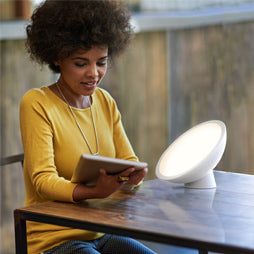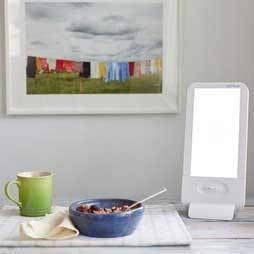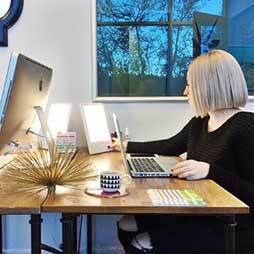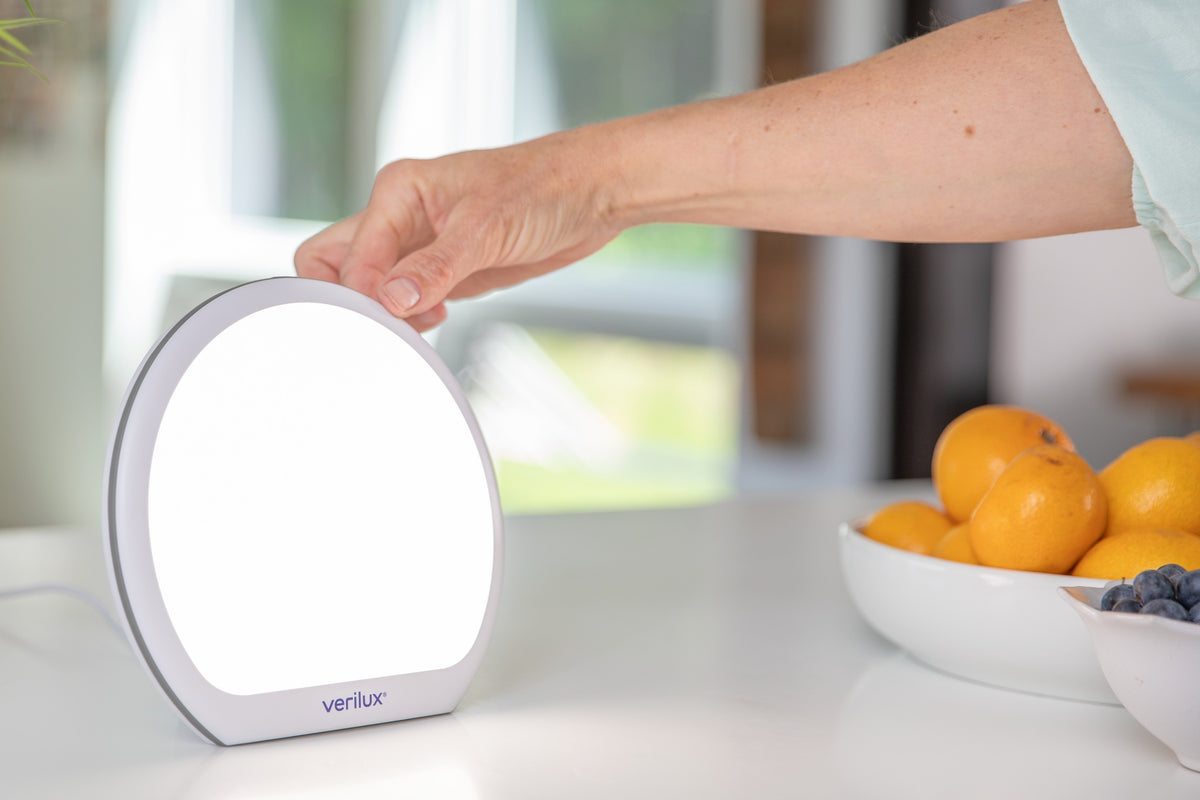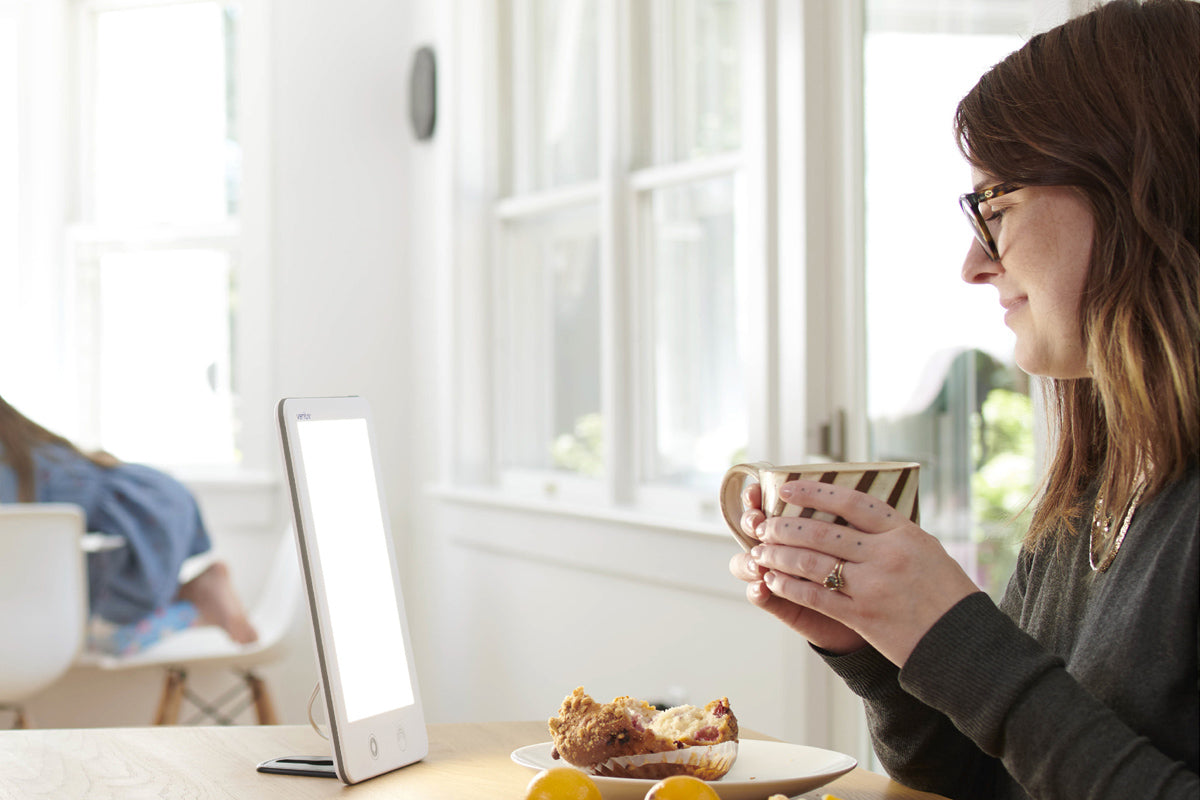Credit: Rawpixel.com / Adobe
by Shelby Deering
We interviewed Dr. Erin Donnelly, a Licensed Clinical Psychologist, to learn why light is so important to health and wellness. Donnelly specializes in the comprehensive psychological treatment of individuals and couples experiencing anxiety/anxiety-related disorders, mood disorders, traumatic reactions/posttraumatic stress, chronic pain/health conditions, and sexual/reproductive difficulties.
When you’re planning what your healthiest day looks like, what do you see? Perhaps you visualize a pair of running shoes sitting next to the door, ready for your morning jog. A grocery list filled with wholesome, nourishing foods. An appointment with your acupuncturist or massage therapist.
But when you picture that ideal, healthy day, do you also see yourself soaking up the rays of the sun? Or sitting next to a light therapy lamp?

Credit: Dasha Petrenko / Adobe
Little do many people know that light is just as essential to our wellbeing as those other healthy practices.
There are plenty of experts who assert that light is the key, and often the missing puzzle piece, to overall good health. One of those experts is Dr. Erin Donnelly, a Licensed Clinical Psychologist and Reproductive Sexologist who specializes in anxiety, mood symptoms, among other physical and emotional challenges.
Donnelly believes in the power of light as a tool to achieving optimal health, and explains why we as humans should care about the light we are getting
“The human body is a complex biological system that has many internal regulating processes. One of the most fundamental regulating systems is our Circadian Rhythm that dictates our sleep/wake cycle. Since humans first appeared on earth, our bodies have responded to light and darkness in numerous ways,” Donnelly says
She goes on to share that as light from the sun hits our retina and skin throughout the day, our body responds with a cascade of chemical processes that affect our energy, mood, metabolic pathways, and sleep/wake patterns that allow our bodies to recharge.
“When our body receives insufficient or inconsistent light as compared to what it requires to maintain balance, we often see the onset of sleep/wake disorders, such as delayed sleep phase syndrome, advanced sleep phase syndrome, jet lag, shift maladaptation syndrome, non-24 hour sleep/wake syndrome, and dyschronosis [a bone growth disorder]. These disorders can also be due to offset or continuously changing schedules that interrupt our normal exposure to appropriate sunlight.”
She explains that the limited sunlight experienced during winter can especially impact one’s health.
“In the winter time, many people begin noticing changes in their mood and energy levels, sometimes so significantly that people meet criteria for a diagnosis of Seasonal Affective Disorder. Reduced exposure to sunlight can also sometimes lead to Vitamin D deficiencies and other health conditions.”
We should remember that since many modern people spend time indoors or at desk jobs, this means less light in our days, something that was never experienced by our early human ancestors.
How Light Has Impacted Humans Since The Beginning

Credit: Dan Gold/Unsplash
Since the very start of the human race, our bodies have relied upon light. Donnelly says, “Our modern genome has existed for hundreds of thousands of years and has evolved over time. Our ancestors’ schedules were dictated by the light of the sun and the darkness of the night. Light indicated when it was time for hunting, gathering, working, and farming, among other activities.”
Those activities generally don’t fill the days of those who are a part of modern society—hence why we struggle to get the amount of light our bodies require. And Donnelly has a historical explanation for this.
“Most typically, daytime was when humans expended the most energy and engaged in social ways. Since the Industrial Revolution, beginning around 1760, our society has changed drastically, and our genome has not had adequate time to evolve or adapt. Industrialized society has monumentally changed the ways in which we approach day-to-day life.”
And just because our habits and routines have changed doesn’t mean our bodies have changed needs. Donnelly says, “Our genomes are ancient in comparison to modern advances and still require the biological basics of light, sleep, water, nutritious foods and, exercise.”
Simply put, light fuels fit and healthy lives, both physically and mentally.
Light is Essential to Good Health
Credit: Antonioguillem/Adobe Stock
Donnelly explains, “Light is essential for several purposes, including regulating our sleep/wake cycle, Vitamin D production, and stimulation of endorphins. Light also has an impact on our immune system.”
She thinks that light should be an integral part of any healthy routine, and should be used alongside other nourishing practices. In fact, light can boost their effectiveness.
“Any time that we are able to implement multiple health practices in sync, the benefits are complementary and mutually amplifying. Sufficient light, exercise, and water intake allow our body to process nutrients more effectively. Sleep becomes more regulated and all systems continue working together in a positive fashion, enhancing the entirety of our well-being and mood. When our mood is improved, we are also more motivated to engage in health-enhancing behaviors. Our ancient genomes dictate our health based on appropriate light, nutrition, water intake, and physical activity that our bodies have evolved to crave in order to maintain homeostasis, a state of biological balance.”
This balance is also something that’s crucial for our brain chemicals, which can impact anything from our moods to our sleep cycles.
Donnelly says, “Light hitting our retina sends signals to our pineal gland, our internal clock, which signals a cascade of chemical reactions that regulate our biological schedule to our brains. The process involves serotonin (the precursor to melatonin), melatonin, and cortisol. Humans are diurnal creatures, meaning that we are awake during the light daytime hours and become sleepy in the evening when light fades to darkness. Chemicals involved in our rhythmic processes rise and fall throughout the day. When our bodies are regulated consistently, our internal systems have adequate time to recharge and refresh.”
Of course, sleep is a non-negotiable for a healthy lifestyle.
“Sleep is vital for neurological processes, including memory consolidation, emotional processing, and physiological processing, including cell regeneration. Sleep is one, if not the most, important function in our day to maintain a healthy lifestyle and have consistent energy to complete daily tasks.”
As it turns out, all of our healthy efforts can be tied to light in one way or another.
Boost Your Light Intake Every Day

Credit: UBER IMAGES /Adobe Stock
As office dwellers, how are people supposed to find all that health-boosting light, and have enough time to experience its benefits?
First of all, whenever you are able to, get yourself outside and into the sunlight, and according to Donnelly, there are some factors that can affect that light.
“The amount of sunlight that people obtain can vary slightly depending on the time of year—the amount of skin we have exposed to the sun and the directness of the sun’s rays. However, it is generally recommended that adults receive a minimum of 10 minutes in the sun. In winter months with minimal skin exposed, a couple of hours may be more appropriate.”
But let’s be honest—how many of us will actually set out to grab an hour or two in the sun or have the time to do so? That’s where HappyLight® therapy lights come in.
Donnelly says that getting enough exposure to the sun can be challenging, adding, “which is where light boxes become extremely helpful to supplement sunlight.”
As Donnelly says, people should strive for daily exposure of 30 minutes to an hour, “fairly early in the morning.”
She elaborates, saying, “Make sure to check positioning and distance of the lamp so that your eyes are exposed appropriately.”
When it comes to light therapy, Donnelly prefers Verilux lamps.
She says, “I highly recommend Verilux as a reliable, affordable, and intelligent source of light-based products.”
Verilux therapy lights are the perfect supplement to days that often go by without a trace of the sun, whether we’re stuck indoors or it’s too cloudy outside for the sun to appear. Now, thanks to therapy lights, we can go back to our beginnings as humans who had all their health needs met, spurred on by those essential rays of light.


